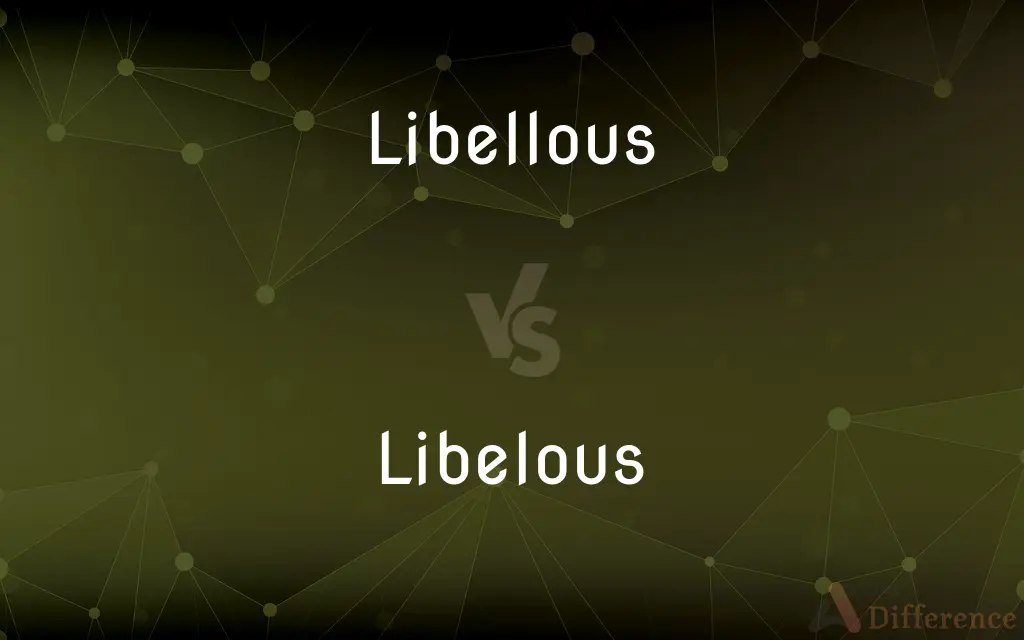Libellous vs. Libelous — What's the Difference?
Edited by Tayyaba Rehman — By Maham Liaqat — Updated on April 17, 2024
"Libellous" is the British English spelling for describing something that unfairly harms someone's reputation, while "libelous" is the American English variant.

Difference Between Libellous and Libelous
Table of Contents
ADVERTISEMENT
Key Differences
"Libellous" is commonly used in British English contexts, reflecting the typical British spelling with a double 'l'. On the other hand, "libelous" adheres to American English spelling conventions, which often simplify words by reducing double letters.
When writing formal documents, using "libellous" in the UK is advisable to maintain consistency with other British English spellings. Whereas in the US, "libelous" is preferred and is considered the correct form in legal and journalistic texts.
The pronunciation of "libellous" and "libelous" remains the same despite the spelling difference, focusing on the soft 'l' sounds. However, the choice of spelling can influence the perceived formality and correctness in regional publications.
Dictionaries and spell checkers may flag "libellous" as incorrect in American settings, while "libelous" might be marked in British contexts, indicating the importance of selecting the appropriate version based on the audience's locale.
Educators and editors in English language often emphasize the importance of consistency in spelling choices according to the chosen dialect of English, which affects the use of terms like "libellous" and "libelous".
ADVERTISEMENT
Comparison Chart
Spelling Standard
British English
American English
Common Usage
UK, Commonwealth countries
United States
Dictionary Listings
Listed as standard in UK
Listed as standard in US
Spell Check Recognition
Correct in UK English
Correct in US English
Legal and Media Reference
Used in legal terms in UK
Used in legal terms in US
Compare with Definitions
Libellous
Describing a statement that is defamatory and untrue.
The newspaper article was criticized for being potentially libellous.
Libelous
Referring to damaging false statements in writing.
He was accused of making libelous statements in his blog.
Libellous
Involving an accusation without proof.
Libellous comments can ruin reputations.
Libelous
Implying harm to someone's reputation through written words.
The libelous tweet was quickly deleted.
Libellous
Pertaining to written defamation.
She sued the magazine for its libellous claims.
Libelous
Characterized by or constituting libel.
The accusations were found to be libelous in court.
Libellous
Legal term in British English.
The libellous nature of the statements led to a lawsuit.
Libelous
A term used in American legal contexts.
He hired a lawyer to handle the libelous case.
Libellous
Suggestive of libel.
The libellous content was removed from the website.
Libelous
Associated with defamation in written form.
The libelous article led to several lawsuits.
Libellous
Containing or constituting a libel
A libellous newspaper story
Libelous
Involving or constituting a libel; defamatory.
Libellous
Involving or constituting a libel; defamatory.
Libelous
Defamatory, libeling, referring to something that causes harm to someone's reputation especially with malice or disregard.
The accusation was libelous, full of falsehoods, spite and malice.
Libellous
(British spelling) libelous
Libelous
Meeting the legal standards for libel.
The court found the statement was not libelous because it was true.
Libellous
(used of statements) harmful and often untrue; tending to discredit or malign
Libelous
Containing or involving a libel; defamatory; containing that which exposes some person to public hatred, contempt, or ridicule; as, a libelous pamphlet.
Libelous
(used of statements) harmful and often untrue; tending to discredit or malign
Common Curiosities
In which English-speaking countries is "libellous" the preferred spelling?
"Libellous" is preferred in the UK, Australia, Canada, and other Commonwealth nations.
How can I remember which spelling to use?
Remember that "libellous" has an extra 'l', similar to other British English spellings like "travelled."
What should I use in academic writing in the U.S.?
Use "libelous" in academic writing in the U.S. to align with American English standards.
Can using the wrong variant affect search engine optimization (SEO)?
Yes, using the regionally correct term can improve SEO by aligning with local search terms and preferences.
How do British and American dictionaries treat these variations?
British dictionaries list "libellous" as the standard spelling, while American dictionaries list "libelous."
Why do "libellous" and "libelous" have different spellings?
The difference stems from regional spelling conventions in British and American English.
Which version of the word is used in international legal documents?
International legal documents might use either, depending on the document's origin or the intended audience.
Is there a difference in legal implications between "libellous" and "libelous"?
No, both terms refer to the same legal concept of defamation through written or published material.
Are there any mnemonic devices to help distinguish between "libellous" and "libelous"?
Think of the single 'l' in "libelous" as similar to the single 'l' in "United States."
What happens if I use "libellous" in an American legal document?
While it's not legally problematic, it might be marked as a spelling error or appear unprofessional.
Is "libellous" ever acceptable in American English?
It may be used for stylistic purposes or in quotes from British sources but is generally considered a spelling mistake.
What advice is given to non-native English speakers about these variations?
Non-native speakers are advised to consistently use the spelling of the version of English they are learning or using most frequently.
How does the choice between "libellous" and "libelous" reflect on a writer's attention to detail?
Using the correct regional spelling demonstrates attention to detail and awareness of language nuances.
What should journalists consider when choosing between "libellous" and "libelous"?
Journalists should consider their audience and publication standards to choose the appropriate regional spelling.
Are there tools to help writers automatically adjust to British or American spellings?
Yes, many word processors and writing enhancement platforms offer language settings that adapt to British or American English.
Share Your Discovery

Previous Comparison
Ecstasy vs. Euphoria
Next Comparison
Who vs. WhomAuthor Spotlight
Written by
Maham LiaqatEdited by
Tayyaba RehmanTayyaba Rehman is a distinguished writer, currently serving as a primary contributor to askdifference.com. As a researcher in semantics and etymology, Tayyaba's passion for the complexity of languages and their distinctions has found a perfect home on the platform. Tayyaba delves into the intricacies of language, distinguishing between commonly confused words and phrases, thereby providing clarity for readers worldwide.
















































